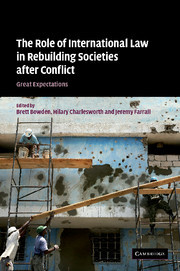Description
The Role of International Law in Rebuilding Societies after Conflict
Great Expectations
Coordinators: Bowden Brett, Charlesworth Hilary, Farrall Jeremy
This volume of essays investigates the many roles international law can play in rehabilitating societies after conflict.
Language: English
Subject for The Role of International Law in Rebuilding Societies...:
The Role of International Law in Rebuilding Societies after Conflict
Publication date: 08-2012
Support: Print on demand
Publication date: 08-2012
Support: Print on demand
The role of international law in rebuilding societies after conflict: great expectations
Publication date: 04-2009
348 p. · 15.7x23.4 cm · Hardback
Publication date: 04-2009
348 p. · 15.7x23.4 cm · Hardback
Description
/li>Contents
/li>
International law can create great expectations in those seeking to rebuild societies that have been torn apart by conflict. For outsiders, international law can mandate or militate against intervention, bolstering or undermining the legitimacy of intervention. International legal principles promise equality, justice and human rights. Yet international law's promises are difficult to fulfil. This volume of essays investigates the phenomenon of post-conflict state-building and the engagement of international law in this enterprise. It draws together original essays by scholars and practitioners who consider the many roles international law can play in rehabilitating societies after conflict. The essays explore troubled zones across the world, from Afghanistan to Africa's Great Lakes region, and from Timor-Leste to the Balkans. They identify a range of possibilities for international law in tempering, regulating, legitimating or undermining efforts to rebuild post-conflict societies.
Introduction Brett Bowden, Hilary Charlesworth and Jeremy Farrall; 1. The 'state-building enterprise': legal doctrine, progress narratives and managerial governance Outi Korhonen; 2. Democratisation, state-building and politics as technology Nehal Bhuta; 3. International law, human rights and the transformative occupation of Iraq Peter G. Danchin; 4. Defining democracy in international institutions Brett Bowden and Hilary Charlesworth; 5. Democracy and legitimation: challenges in the reconstitution of political processes in Afghanistan William Maley; 6. Impossible expectations? The UN security council's promotion of the rule of law after conflict Jeremy Farrall; 7. Legal pluralism and the challenge of building the rule of law in post-conflict states - a case study of Timor-Leste Laura Grenfell; 8. From paper to practice: the role of treaty ratification post-conflict Helen Durham; 9. Selective universality? Human rights accountability of the UN in post-conflict operations Annemarie Devereux; 10. Security starts with the law: the role of international law in the protection of women's security post-conflict Amy Maguire; 11. Grappling in the Great Lakes: the challenges of international justice in Rwanda, the Democratic Republic of Congo and Uganda Phil Clark; 12. Conclusion: hope and humility for weavers with international law John Braithwaite.
© 2024 LAVOISIER S.A.S.




